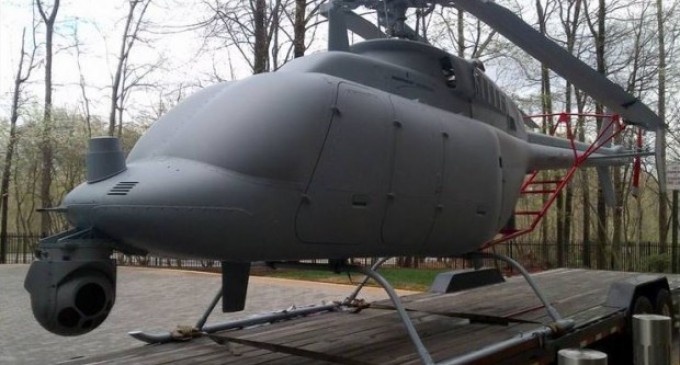
Earlier this month the FAA released a map that set the stage for 7,500 surveillance drones to be flying in U.S. skies within the next two years.
The FAA forecast that 30,000 surveillance drones will be in U.S. skies by the end of the decade.
Northrop Grumman’s unmarked gray helicopter drone, the MQ-8C Fire Scout, is described as a “next generation” drone, has “three times the payload capacity of the current model in the military arsenal,” can remain airborne for twice as long and, of course, can be fitted with all manner of surveillance technology.
With a little paint and a little altitude it would be hard to distinguish that from a regular helicopter, but I guess that is the point!
The image was sent to us by someone high up within Northrop Grumman, who told us that the drone is small enough to transported on the back of a large truck or towed in a trailer behind a pickup and can be fitted with all manner of surveillance technology.
It appears to be a smaller version of the company’s MQ-8C Fire Scout helicopter drone, which was tested for the first time earlier this month by the U.S. Navy. Unlike the MQ-8C Fire Scout, the drone seen in the image above has no markings.
The MQ-8C Fire Scout, described as a “next generation” drone, has “three times the payload capacity of the current model in the military arsenal,” and can remain airborne for twice as long.
Earlier this month, the Federal Aviation Administration released a road map that set the stage for 7,500 surveillance drones to be flying in U.S. skies within the next two years. The FAA’s chief concern is not the privacy implications of such devices, but the threat of them colliding with other aircraft.
The FAA has forecast that 30,000 surveillance drones will be in U.S. skies by the end of the decade.
At least 80 law enforcement agencies already have agreements with the FAA to fly drones for surveillance purposes. Some police departments wants to use such drones to watch for “suspicious activity” in high crime areas.
Authorities are already using drones to conduct surveillance of farms and the Department of Homeland Security is also working on deploying drones for purposes of “public safety.”
Earlier this year, the Pentagon began testing to deploy two high-tech surveillance blimps over Washington DC that can remain at 10,000 feet for a month without the need for refueling. The blimps provide an “elevated, persistent over-the-horizon sensor system” and carry “powerful radars that can look deep into enemy territory.”
The U.S. Army also recently tested a football field-sized blimp over the city of New Jersey. The blimp can fly for a period of 21 hours and “is equipped with high-tech sensors that can monitor insurgents from above.”
This past August, the DHS assumed control of surveillance blimps used to monitor the US-Mexico border, a perturbing development for privacy advocates given that the federal agency considers all areas 100 miles inland of the border to be ‘constitution-free zones’ within which the Fourth Amendment does not apply.
